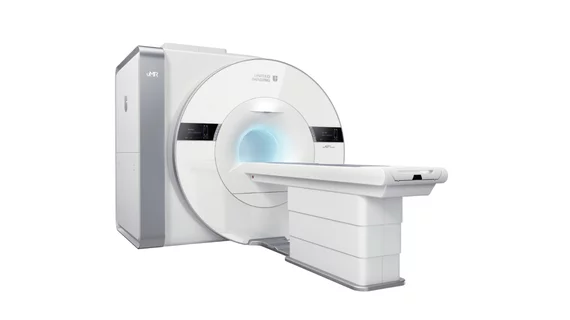First 5T MRI to offer whole-body imaging scores FDA clearance
The U.S. Food and Drug Administration has cleared the first 5T MRI scanner for whole body applications.
Houston, Texas-based United Imaging announced the clearance of its uMR Jupiter 5T MRI system, a whole-body, ultra-high field scanner. This marks the first ultra-high field MRI system cleared for whole-body applications. It is also the first scanner of any strength to offer an 8-channel whole-body multi-transmit system.
"For decades, whole body applications above 3T have been elusive, and this system was targeted to open those doors. uMR Jupiter breaks new ground and defines a new technical category of systems,” Al Zhang, PhD, chairman and co-CEO of United Imaging, said in a release.
Due to its powerful magnetic field, the 5T scanner offers superior image resolution, signal-to-noise ratio and clarity, but it does not come with the additional bulk common among most larger magnets. The 5T magnet can be installed in a smaller 3T room.
It offers multi-nuclei imaging as well, which can provide metabolic and functional information for patients.
United Imaging stated that it sought to address two key pain points commonly associated with MRI—image uniformity and safety.
Jeffrey M. Bundy, PhD, president and chief commercial officer of United Imaging in North America, also commented on the clearance, expressing optimism for the scanner's potential to extend the use of ultra-high-field imaging to areas where it may have previously been out of reach.
“We have always prioritized innovation that can make a broad clinical impact,”, Bundy said in the release. “Because it is aimed first and foremost at bringing ultra-high-field into greater clinical use, we believe it will have an exciting impact across our industry, and for clinical patients across the globe who have never had access to ultra-high-field in the past.”
The scanner is expected to be on display at the International Society for Magnetic Resonance in Medicine annual meeting taking place next week in Singapore.

